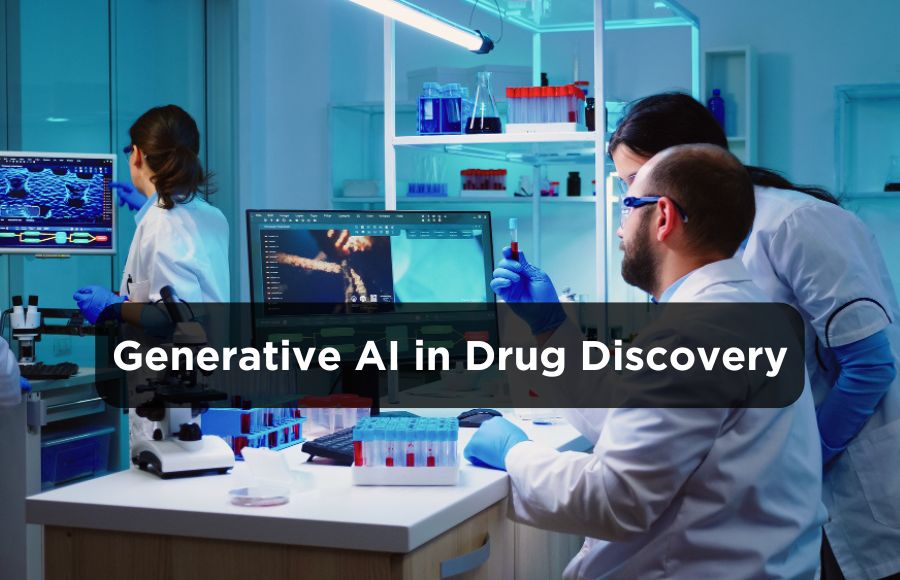In recent years, generative AI has emerged as a transformative force in drug discovery. This cutting-edge technology, which involves algorithms capable of creating new data patterns, has revolutionized the way we approach the development of new medicines. But what exactly is generative AI, and how is it reshaping the landscape of pharmaceutical research? Let’s dive in.
Unveiling Generative AI
Generative AI refers to a subset of artificial intelligence that can generate new, original content. Unlike traditional AI, which analyzes existing data, generative AI can create new data points. In drug discovery, this means it can design novel molecules and predict their effectiveness as potential drugs.
Speeding Up Drug Discovery
One of the most significant impacts of generative AI in drug discovery is its ability to accelerate the process. Traditional drug development is a lengthy and costly endeavor, often taking over a decade and billions of dollars to bring a new drug to market. Generative AI can significantly reduce this time frame.
Faster Lead Identification
Generative AI algorithms can quickly generate thousands of potential drug candidates. This rapid generation allows researchers to identify promising leads much faster than traditional methods. For example, Insilico Medicine, a company specializing in AI-driven drug discovery, identified six new drug candidates in just 21 days using generative AI.
Efficient Optimization
Once potential leads are identified, they need to be optimized for better efficacy and reduced side effects. Generative AI excels here as well. It can predict how changes to the molecular structure of a drug candidate will affect its performance, enabling rapid optimization. This process, which once took months, can now be completed in weeks.
Cost Reduction
The high cost of drug development is a major barrier to bringing new treatments to market. Generative AI can help cut these costs significantly. By streamlining the discovery and optimization phases, companies can save substantial amounts of money.
Reducing Lab Work
Generative AI models can simulate how molecules will behave in the human body, reducing the need for extensive lab testing. According to a report by Accenture*, AI-driven drug discovery could reduce research and development costs by up to 70%.
Minimizing Failures
Many drug candidates fail during clinical trials, resulting in wasted resources. Generative AI can predict potential failures earlier in the process, allowing researchers to focus on the most promising candidates. This predictive power can reduce the high failure rate in drug development, which currently stands at about 90%.
Enhancing Innovation
Generative AI is not just about speed and cost; it’s also about innovation. The ability of AI to explore vast chemical spaces beyond human capability opens up new possibilities for drug discovery.
Discovering Novel Compounds
Generative AI can identify novel compounds that would be impossible for humans to find. For instance, researchers at MIT used generative AI to discover Halicin, a new antibiotic that can kill drug-resistant bacteria. This discovery was made by training an AI model on a database of molecules and then having it generate new ones with desired properties.
Personalizing Medicine
Generative AI also holds promise for personalized medicine. By analyzing an individual’s genetic makeup and disease profile, AI can generate tailored drug candidates. This personalized strategy has the potential to yield more effective therapies with reduced side effects.
Collaboration with Human Experts
Despite its capabilities, generative AI is not replacing human researchers. Instead, it is a powerful tool that complements human expertise. Scientists provide the biological insights and contextual understanding that AI lacks, while AI offers computational power and pattern recognition beyond human capability.
Synergistic Approach
The synergy between AI and human experts leads to more innovative and effective solutions. For example, Pfizer partnered with IBM Watson to leverage AI in identifying new drug targets**. This collaboration has accelerated their research and brought new insights that were previously unattainable.
Ethical Considerations
While generative AI holds great promise, it also raises ethical considerations. Ensuring the safety and efficacy of AI-generated drug candidates is crucial. Rigorous testing and regulatory oversight are essential to ensure that AI-driven discoveries meet the highest standards of patient safety.
The Future of Drug Discovery
The future of drug discovery is undoubtedly intertwined with generative AI. As technology advances, its role in the pharmaceutical industry will only grow. With the potential to revolutionize the speed, cost, and scope of drug discovery, generative AI is set to usher in a new era of medical innovation.
Transformative Potential
Generative AI’s transformative potential extends beyond pharmaceuticals. It can impact various fields, from materials science to agriculture. However, its role in drug discovery is exciting, given its immediate and profound impact on human health.
Conclusion
Generative AI is revolutionizing drug discovery by accelerating processes, reducing costs, enhancing innovation, and fostering collaboration between machines and humans. As we continue to harness this powerful technology, the dream of faster, cheaper, and more effective drug development is becoming a reality. The role of generative AI in drug discovery is not just a promise for the future; it is already transforming the present.
The integration of generative AI into pharmaceutical research marks a new dawn in medicine, promising breakthroughs that could save lives and improve the quality of life for millions. The journey has just started, and the possibilities are endless.
Banner Image by DC Studio on Freepik
References:
*AI-driven drug discovery by Accenture: Reinventing R&D in the age of AI
** Pfizer partnered with IBM Watson: IBM and Pfizer to Accelerate Immuno-oncology Research with Watson for Drug Discovery
![]()



